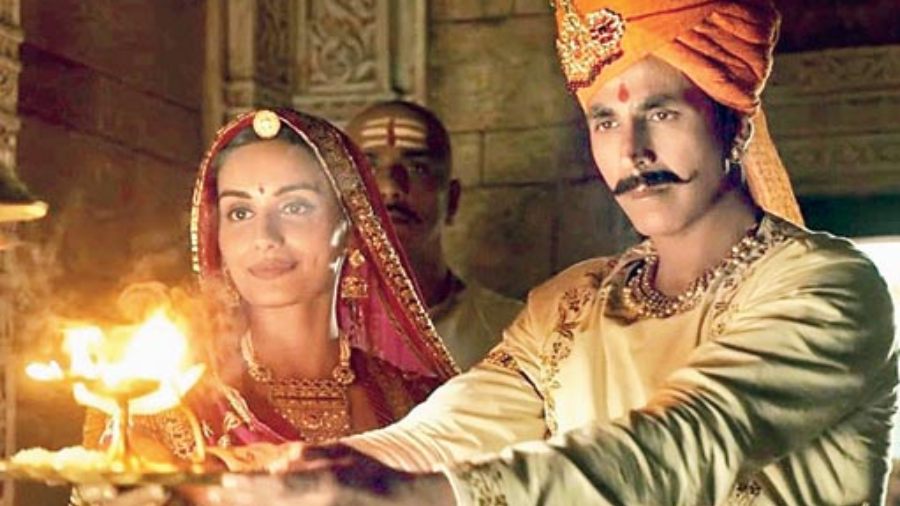Any film — genre, maker, cast, intent — becomes unpalatable even before release if one can clearly spot its political agenda. That Samrat Prithviraj — titled ‘Prithviraj’ till about a week ago — has built at least some part of its promotional machinery, if not its making, around propaganda, has not escaped many. Clearly, what happened centuries ago still needs a push from the politics of the present to grab eyeballs.
That aside, if judged purely on the basis of cinematic merit, Samrat Prithviraj is a case of some hits and quite a few misses. Directed by Chandraprakash Dwivedi — the man behind the Doordarshan series Chanakya, who also directed the Partition film Pinjar — Samrat Prithviraj depicts its titular hero as “the last Hindu emperor” whose death led to India falling into the hands of foreign rule for centuries.
The disclaimer at the beginning credits Prithviraj Raso as the predominant source material for the film. The epic poem, in the Braj language, is attributed to Chand Bardai, who according to the text, was the court poet of the king. However, it is now widely believed that Prithviraj Raso is a blend of historical facts and imaginary legends and is hence not historically reliable.
While its historical accuracy clearly can’t be authenticated, in terms of imagination, Samrat Prithviraj, despite some occasional flourishes, could have been so much more. For a large part of its 135-minute runtime, barring the beginning and the end (with the beginning and the end being the same), the film is largely dull.
Big action set pieces — a given in a film of this genre — are mostly absent, and even in terms of scale and grandeur, Samrat Prithviraj doesn’t quite match up to recent historical films, many of which have been seminal. Clearly, both Sanjay Leela Bhansali and S.S. Rajamouli have spoilt us when it comes to expecting a film of this genre to winningly marry a compelling narrative with jaw-dropping visuals.
Akshay Kumar plays Prithviraj with a beatific smile. The physicality is spot-on and so is the dedication, but a role like this demanded an actor with more range. The narrative predominantly revolves around how Prithviraj’s principled ways and inherent goodness led to his downfall, with his enemies multiplying both at home and across the border. While Muhammad Ghori (played with stink-eye menace by Manav Vij) wants to make inroads into Hindustan, Jaychand (Ashutosh Rana, who is given little scope or screen time), is seeking revenge for the humiliation suffered after his daughter Sanyogita (debutant Manushi Chillar) eloped with Prithviraj right before his eyes.
The first half of Samrat Prithviraj lacks energy. Most scenes are repetitive, and the only actors who infuse some kind of momentum in the narrative are Sanjay Dutt as the delightful and irreverent court elder Kaka Kanha and Sonu Sood, who is solid as Prithviraj’s right-hand man Chand Bardai. Dwivedi, who has reportedly spent 18 years researching the script, dedicates too much of the runtime to unmemorable songs (courtesy a lacklustre Shankar-Ehsaan-Loy) and also makes Samrat Prithviraj too talky, with the dialogues being largely about protecting “dharm, imaan aur sammaan”. The Gladiator-styled climax is perhaps the only goosebump-inducing bit in Samrat Prithviraj. But by then, it’s too little too late.
With the Prithviraj-Sanyogita romance forming a large part of the film, it doesn’t help that there is no palpable chemistry between Akshay and Manushi. In her first film, Manushi is too raw to take on a part of such import. On an aside, she’s just five years senior to Akshay’s son Aarav. That may well explain the reason for the lack of chemistry and also highlights Bollywood’s age-old problem with ageism.
A day before its release, Team Samrat Prithviraj had taken to social media urging viewers not to give out spoilers. Having endured the film, my only question is: Come again?!
Samrat Prithviraj (u/a)
Director: Chandraprakash Dwivedi
Cast: Akshay Kumar, Manushi Chhillar, Sanjay Dutt, Sonu Sood, Manav Vij, Ashutosh Rana, Sakshi Tanwar
Running time: 135 minutes
